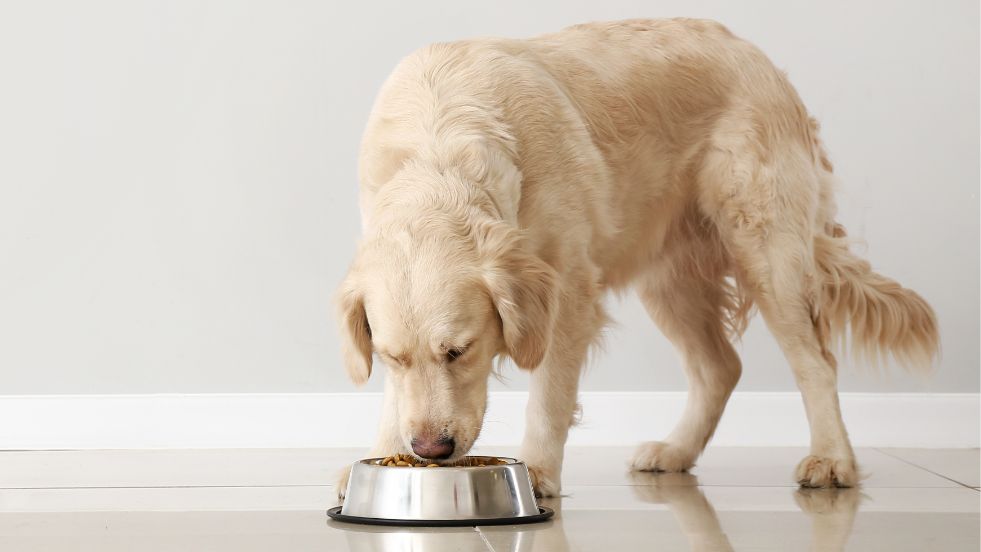Just like humans, dogs can struggle with digestive issues that leave them uncomfortable, lethargic, or even in pain. A sensitive stomach in dogs isn’t a specific disease but rather a symptom that may arise from food intolerances, allergies, or gastrointestinal conditions. The right diet can make a dramatic difference, and as pet parents, it’s important to know what to look for when choosing meals that support digestive health.
How to Tell if Your Dog Has a Sensitive Stomach
If your dog often has tummy troubles, knowing the signs can help you act early. Common symptoms include:
- Frequent vomiting or regurgitation
- Loose stools or diarrhea
- Excessive gas and bloating
- Loss of appetite or pickiness with food
- Signs of abdominal discomfort (such as restlessness, whining, or hunching)
According to the American Kennel Club (AKC), recurrent digestive upset in dogs should never be ignored, as it may indicate underlying issues such as food allergies, intolerances, or gastrointestinal disease (1). If your dog shows chronic symptoms, it’s best to consult your veterinarian before making major dietary changes.
Why Some Dogs Develop Sensitive Stomachs
There isn’t one single reason why dogs develop digestive sensitivities—several factors may be at play:
- Food Intolerances – Some dogs simply cannot digest certain proteins, grains, or additives well. For example, lactose intolerance is fairly common in adult dogs.
- Food Allergies – Ingredients like chicken, beef, wheat, soy, and dairy are known to trigger allergic reactions in sensitive pups.
- Low-Quality Dog Food – Fillers, artificial preservatives, and poor-quality protein sources can make digestion more difficult.
- Sudden Diet Changes – Switching foods abruptly can upset the balance of your dog’s gut bacteria.
- Medical Conditions – Conditions such as pancreatitis, inflammatory bowel disease, or infections may also cause ongoing stomach sensitivity.
Scientific research supports the link between diet and canine gut health. A study published in Frontiers in Veterinary Science (2021) highlighted that well-balanced, highly digestible diets with limited ingredients can improve gastrointestinal tolerance in dogs with chronic digestive issues (2).
Best Dog Foods for Sensitive Stomachs
Choosing the right food for a dog with a sensitive stomach can feel overwhelming, especially with so many options on the market. The key is to focus on formulas that are gentle, nutrient-rich, and specifically designed to support digestive health. Below are some of the most trusted choices, along with what makes them effective:
1. Hill’s Science Diet Sensitive Stomach & Skin
- Why it works: This vet-recommended option uses easily digestible chicken and barley, fortified with prebiotic fiber to nourish healthy gut bacteria. It also contains vitamin E and omega-6 fatty acids, which support skin and coat health — a bonus for dogs with both digestive and dermatological sensitivities.
- Best for: Dogs with recurring loose stools or mild food intolerances.
2. Royal Canin Veterinary Diet Gastrointestinal Low Fat
- Why it works: Specifically formulated for dogs that cannot tolerate high-fat diets, this option helps manage chronic digestive issues such as pancreatitis. It’s highly digestible, with carefully balanced electrolytes and prebiotics for gut support.
- Best for: Dogs diagnosed with gastrointestinal disorders or needing a prescription formula.
3. Purina Pro Plan Sensitive Skin & Stomach (Salmon & Rice Formula)
- Why it works: Featuring salmon as the primary protein and rice as the carbohydrate source, this formula avoids common allergens like beef, chicken by-products, and soy. It also includes probiotics to help regulate digestion and omega-3 fatty acids for joint and immune health.
- Best for: Dogs prone to food allergies and skin flare-ups, along with stomach issues.
4. Blue Buffalo Basics Limited Ingredient Diet (Turkey & Potato)
- Why it works: With a simplified recipe featuring turkey as the single animal protein and potato as the carb source, this food is free of wheat, corn, soy, and dairy. It’s enriched with LifeSource Bits, a blend of antioxidants and vitamins that support overall immunity.
- Best for: Dogs that do well on limited-ingredient diets and need a grain-free option.
5. Wellness Simple Limited Ingredient Diet
- Why it works: This formula uses only a handful of ingredients, with options such as lamb and oatmeal or salmon and potato. It avoids fillers, artificial additives, and gluten, making it easier for sensitive dogs to digest.
- Best for: Dogs with suspected food intolerances or those that need very clean, simple recipes.
6. Canidae Grain-Free PURE Real Salmon & Sweet Potato
- Why it works: A premium grain-free recipe with just 8 main ingredients, including salmon, sweet potatoes, and peas. Added probiotics support digestive health, while the grain-free formula is ideal for dogs that react poorly to grains.
- Best for: Dogs with grain sensitivity or who thrive on high-protein diets.
7. Nutro Limited Ingredient Diet (Lamb & Sweet Potato)
- Why it works: Nutro focuses on non-GMO ingredients and avoids chicken, beef, corn, wheat, and soy. Lamb is a novel protein that’s often gentler on sensitive stomachs.
- Best for: Dogs that don’t respond well to common proteins like chicken or beef.
8. Merrick Limited Ingredient Diet Grain-Free (Duck & Sweet Potato)
- Why it works: With a single-source animal protein and easily digestible carbs, this formula reduces the chance of food sensitivities. It also provides glucosamine and chondroitin, supporting joint health in addition to digestion.
- Best for: Active or aging dogs needing extra joint support alongside digestive care.
Tips for Choosing the Right Food:
- Start with a vet consultation before switching diets.
- Always introduce new food gradually over 7–10 days.
- Monitor your dog’s stool quality, energy levels, and coat condition after the switch.
Comparison Chart: Best Dog Foods for Sensitive Stomachs
| Dog Food Brand & Formula | Main Protein | Grain/Carb Source | Key Benefits | Best For |
| Hill’s Science Diet Sensitive Stomach & Skin | Chicken | Barley | Prebiotic fiber, omega-6 fatty acids, and vitamin E | Dogs with mild stomach issues & skin sensitivity |
| Royal Canin Veterinary Diet Gastrointestinal Low Fat | Chicken by-product meal | Rice & corn | Low-fat, highly digestible, prescription formula | Dogs with chronic GI disorders & pancreatitis |
| Purina Pro Plan Sensitive Skin & Stomach (Salmon & Rice) | Salmon | Rice | Added probiotics, omega-3s, no soy/wheat/corn | Dogs with allergies, skin, + stomach issues |
| Blue Buffalo Basics LID (Turkey & Potato) | Turkey | Potato | Limited ingredients, grain-free, antioxidants | Dogs needing simple recipes & immune support |
| Wellness Simple Limited Ingredient Diet | Lamb / Salmon | Oatmeal / Potato | Few ingredients, no fillers, no gluten | Dogs with food intolerances |
| Canidae PURE Real Salmon & Sweet Potato | Salmon | Sweet potato & peas | Only 8 main ingredients, probiotics, and grain-free | Grain-sensitive dogs need a high-protein diet |
| Nutro LID (Lamb & Sweet Potato) | Lamb | Sweet potato | Non-GMO ingredients, no chicken/beef/wheat/soy | Dogs are sensitive to common proteins |
| Merrick LID Grain-Free (Duck & Sweet Potato) | Duck | Sweet potato | Single-source protein, glucosamine & chondroitin | Active or aging dogs with sensitive digestion |
Homemade Dog Food for Sensitive Stomachs
For some pet owners, preparing homemade meals provides more control over ingredients. Homemade diets can be an excellent option, but they must be balanced to avoid nutrient deficiencies. Work with your veterinarian or a canine nutritionist before committing to a long-term homemade diet.
Here are some gentle, vet-approved options for sensitive tummies:
- Boiled Chicken and Rice: A classic, bland meal that helps settle digestion during flare-ups.
- Turkey and Pumpkin Mix: Turkey is lean and highly digestible, while pumpkin provides soluble fiber to regulate stools.
- Salmon with Sweet Potato: Rich in omega-3 fatty acids and easy on the stomach, sweet potato also supports gut health.
Supplements such as probiotics, digestive enzymes, or fish oil may also be beneficial, but always seek veterinary advice before adding them.
The Science Behind Diet and Digestive Health
Veterinary nutrition studies consistently show that diet plays a critical role in gut health. For example, research published in the Journal of Animal Physiology and Animal Nutrition (2020) found that dogs fed diets rich in prebiotics and high-quality proteins experienced fewer digestive disturbances and had more stable gut microbiota (3). This reinforces the importance of selecting foods with functional ingredients rather than just focusing on taste or brand.
FAQs About Sensitive Stomachs in Dogs
1. How do I know if my dog needs special food for a sensitive stomach?
A. If your dog regularly experiences diarrhea, vomiting, or bloating after meals, it may be time to try a specialized diet. Always consult your vet first to rule out medical causes.
2. Can I give my dog human foods for a sensitive stomach?
A. Yes, some human foods like boiled rice, plain chicken, or pumpkin can help. However, avoid toxic foods like onions, garlic, grapes, and chocolate. Balanced, dog-formulated diets remain the safest long-term solution.
3. How long does it take for a new diet to improve my dog’s stomach issues?
A. Most dogs show improvement within 1–3 weeks after switching to a gentler, more digestible food. Consistency and gradual transition are key.
Final Thoughts:
Finding the best dog food for sensitive stomachs takes patience, trial, and professional guidance. High-quality, limited-ingredient, and easily digestible diets are usually the best options, whether store-bought or homemade. Paired with veterinary input, these changes can significantly improve your dog’s comfort, energy levels, and overall well-being. A happy, healthy gut leads to a happier dog—and a more relaxed pet parent.
References:
1. Everything You Need to Know About Food Allergies in Dogs
2. The Effects of 7 Days of Feeding Pulse-Based Diets on Digestibility
3. Perspectives on functional foods for improvement of canine health











